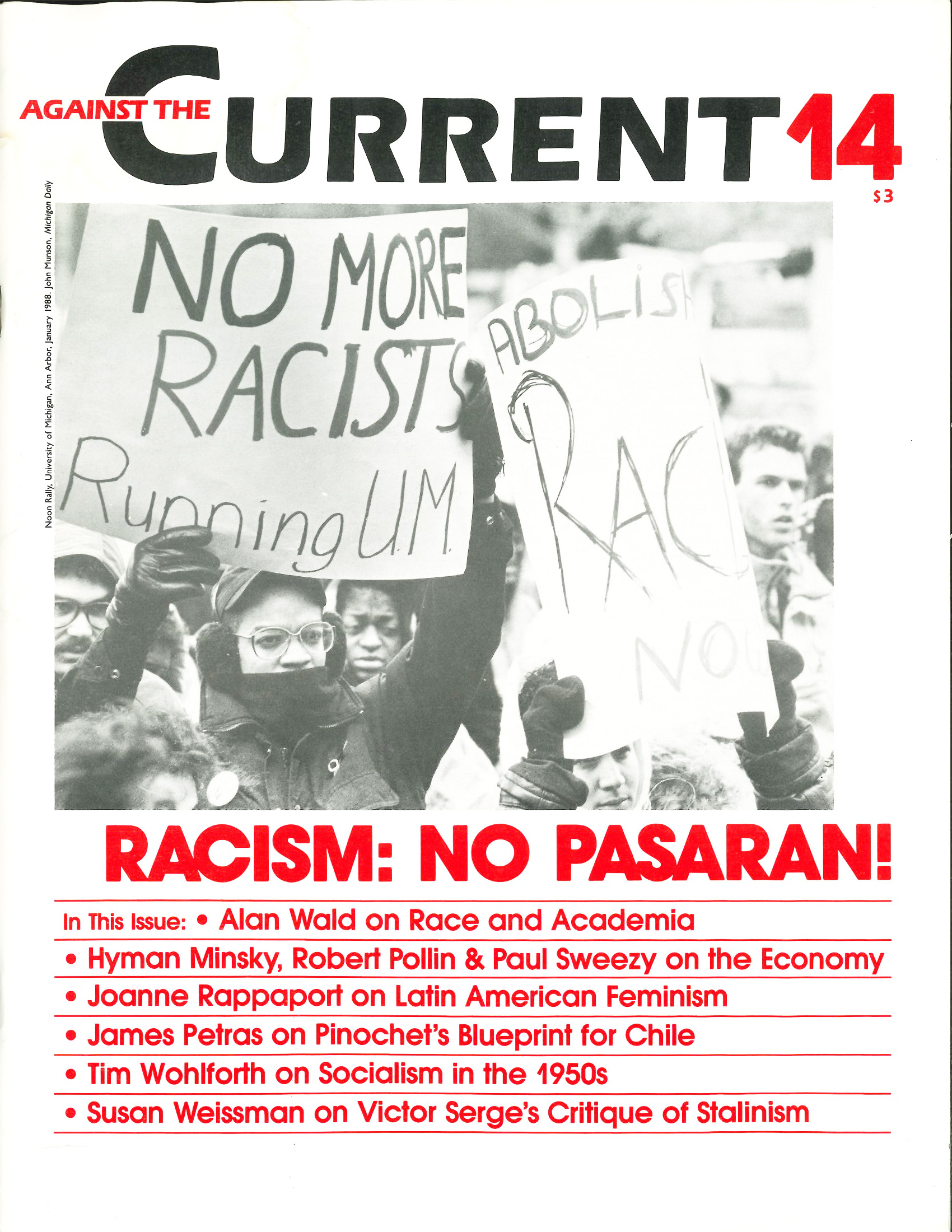Against the Current, No. 14, May/June 1988
-
From Locked Out to Locked In?
— The Editors -
Our Heroes, As We See Them
— Sol Saporta -
Eyewitness to the Palestinian Uprising
— an interview with Marty Rosenbluth -
Latin American Women: "We're All Feminists"
— Joanne Rappaport -
Chile in 2000: The Generals' Blueprint
— James Petras -
Revolutionaries in the 1950s
— Tim Wohlforth -
Victor Serge's Critique of Stalinism, Part II
— Suzi Weissman -
Random Shots: The Bones Break, the Clubs Hold
— R.F. Kampfer - Resisting the New Racism
-
Racism and the University
— Alan Wald -
South Africa's Media Scam
— Dianne Feeley - The Economy & the Crash
-
After the Crash: A New Stage?
— Frank Thompson -
Accumulation Leads to Crisis
— Paul Sweezy -
Who's Been on a Binge?
— Robert Pollin -
In a World of Uncertainty
— Hyman P. Minsky - Review
-
What Makes Things Change?
— Tony Smith - Dialogue
-
Against Radical Mythology
— Peter Drucker -
The Power of Radical Religion
— Ken Todd - Letters to the Editors
-
Clarify Palestinian Self-Determination
— Charlie Post -
Market Socialism through Socialist Feminist Analysis
— Ilene Winkler
Frank Thompson
THE RECORD-BREAKING crash in stock prices last October has prompted diverse interpretations. Conventional economic pundits have almost entirely limited themselves to speculation as to the immediate “technical” determinants of the market fall: the preceding slight tightening of credit by the Federal Reserve, uncontrolled computerized program trading, the failure of nerve and/or undercapitalization of some specialist firms responsible for making markets in specific stocks.
Likewise a plethora of hurried analyses by ad hoc governmental and semi-private commissions have delivered separately soothing, if, on examination, collectively inconsistent, suggestions for superficial reforms in stock market trading procedures. Largely absent from conventional accounts has been an effort to relate the stock market crash to a fundamental analysis of the prospects of the capitalist economy, which stock prices as supposed to represent.
Unsurprisingly, many economists on the left were neither so shocked by the market crash, nor at all so ill-disposed to understand it in the context of current theories of secular economic crisis. The last issue of ATC included contributions by Robert Brenner, Mary Malloy, and Steve Rose, which, in different ways, situated the crash in the context of recent work in Marxian political economy.
The Union of Radical Political Economists (URPE) presented a plenary session, “The Crash of 1987: What Does It Mean?” last December 28 at the annual meeting of the Allied Social Science Associations in Chicago. URPE, founded in 1968, is the largest, and generally recognized to be the most effective, “leftist” association in the social sciences. Its quarterly journal, the Review of Radical Political Economics, and Newsletter can be recommended to ATC readers with an interest in political economy. Among the presentations to the standing-room-only audience of over 500 were those of prominent URPE-member economists Hyman P. Minsky, Robert Pollin, and Paul Sweezy. ATC is delighted to prices are supposed to publish these presentations here.
May-June 1988, ATC 14

